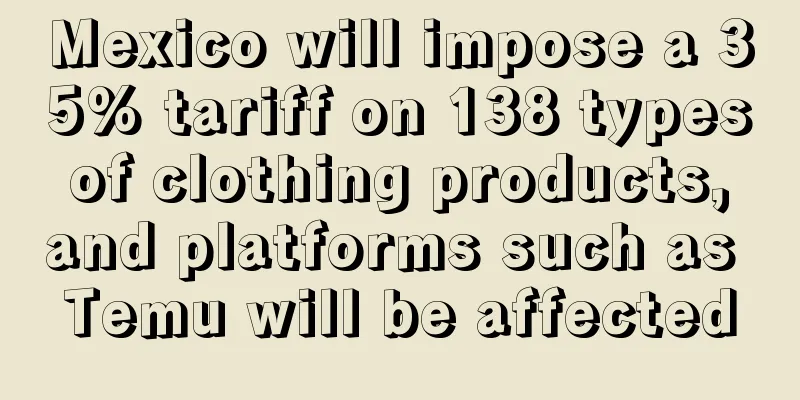Mexico will impose a 35% tariff on 138 types of clothing products, and platforms such as Temu will be affected

|
It is learned that the Mexican government recently announced that it will implement a new tariff policy on imported textiles from Asia before 2026, mainly targeting Asian countries such as China. This measure will impose a 35% import tax on 138 types of clothing products and a 15% import tax on 17 types of textiles. The move is aimed primarily at curbing textile imports from low-priced markets, and the Mexican government stressed that the measures target specific categories of products rather than a single country. The tax is intended to protect local industries and jobs as Mexico's textile industry has seen its gross domestic product fall by 4.8% in recent years and lost 79,000 jobs. It is understood that this new tax policy does not apply to countries that have signed free trade agreements with Mexico, especially Mexico's largest trading partner, the United States. Therefore, textile imports to the United States will not be affected by this policy. Data shows that in 2023, Mexico's main sources of textile imports include China (US$4.6 billion), the United States (US$3.2 billion), Vietnam (US$665 million), Bangladesh (US$595 million) and India (US$472 million). In particular, low-priced textiles imported through e-commerce platforms such as Shein, Temu and AliExpress have a significant incremental impact on the Latin American market, which is one of the reasons why the Mexican government introduced this new policy. In addition, the situation in Mexico and other Latin American countries is also changing. For example, Chile and Brazil recently abolished the tax-free policy for low-cost goods purchased on such e-commerce platforms, setting a tax-free cap of $41 and $50 respectively. The introduction of this policy by Mexico comes at a time when the global trade environment is changing, especially in the Americas. During President Trump's term, the United States promised to impose a 25% tariff on all Mexican imports to encourage Mexico to strengthen its crackdown on illegal immigration and smuggling. This new tax policy also reflects, to a certain extent, the Mexican government's game between globalization and the protection of local industries. Author✎ Summer/ |
>>: Home Depot leads U.S. home improvement spending share, Amazon in third
Recommend
Macy's Q4 revenue is poor, plans to close 150 stores
It is learned that recently, Macy's announced ...
The CPC of some categories on Amazon is as high as 8-10 US dollars? In the era of high-cost operation, should we choose high-priced products or low-priced products? How can we maximize profits?
Lost Uncle My C position There was a time when I w...
Starting from scratch, Shopify's 30-day store opening tutorial - Day 24
Everyone who does e-commerce has to come into con...
How to achieve from 0 to 1 in the first month of launching a new product
Image source: 123rf.com.cn New products on Amazon ...
What is Google Trends? Google Trends Review
Google Trends is a product launched by Google base...
The FBA lost goods rate is as high as 50%. Sellers file claims but are blocked instead?
This year's FBA lost goods phenomenon is like ...
Sellers, assemble! Amazon’s “account scanning” is fraught with dangers. How can you break through?
After the Spring Festival, Amazon's "acco...
The technical tutorial of breaking the BG mark is sold at 6k at the beginning and now it is sold at hundreds.
Breakthrough BG Standard Technical Tutorial Speci...
Many operators have fallen into these 16 pitfalls of advertising on Amazon!
text As an important promotion method, Amazon adv...
UPS and the union have a tense relationship in the United States! The largest strike in history may occur
It is learned that in the past year, strikes in la...
What is Klout? Klout Review
Klout is a website tool and social media analytics...
What is Promotion? Promotion Review
Promotion is an activity launched by Amazon to enc...
The U.S. Department of Justice seized $12 million worth of counterfeit drugs and pointed the finger at China!
<span data-shimo-docs="[[20,"获悉,据外媒报道,近日美国...
Fines exceed 140,000! Temu removes a large number of sellers' products!
Faced with an increasingly competitive market envi...
What is 2Cshop? 2Cshop Review
2Cshop cross-border e-commerce mall station provid...









